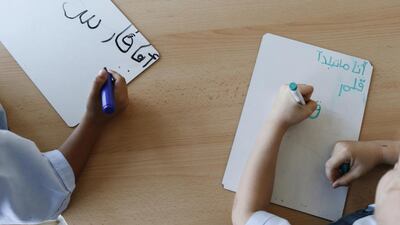DUBAI // Private-school regulators are seeking to improve the quality of Arabic lessons with a new teacher-training conference.
The Knowledge and Human Development Authority (KHDA) announced on Tuesday that it would offer What Works Arabic Plus, a day-long series of workshops to help educators exchange ideas on teaching and learning Arabic.
The government agency already organises What Works conferences on core subjects, such as maths and science, as well as literacy.
But, due to a growing demand for Arabic language lessons, they have decided to dedicate an entire session to Arabic.
“We never had a whole What Works event on Arabic and we decided we would go for it because there’s a need and a demand for it,” said Dr Sonia Ben Jaafar, managing director of EduEval Educational Consultancy, who works as a consultant for KHDA.
She said the workshop was based on two years of feedback and research into Arabic lessons in schools.
“Pockets of excellence were found, which we’re proud of, and then pockets of improvements were found. What I think you have now is a series that really says we know what our national agenda is, we know what our goals are, we know what our priorities are, let’s really just go there and try to help people improve that piece, and Arabic came up as a piece.”
As well as improving the standard of language and cultural lessons the course aims to boost teachers’ confidence in teaching the subject, said Dr Ben Jafaar
The What Works conferences have been held since 2012 to offer teachers and school administrators a chance to learn best classroom practices from others in the profession.
To date, more than 4,500 educators have taken part in the programme.
Private schools in Dubai are required to offer four Arabic-language classes per week to all non-Arab pupils up to Grade 9.
For private schools with Arabic pupils, it must offer them six Arabic-language classes per week up to Grade 3, five per week from fourth to sixth grade and a minimum of four classes up to Grade 12.
Hind Al Mualla, the KHDA’s chief of engagement, said What Works “has unique features and one of them is it brings educators, the community, government entities and the private sector to collaborate to support education”.
One of the schools that was highlighted for its Arabic teaching was the Indian High School.
Ashok Kumar, the school’s chief executive, said it was important for pupils to immerse themselves in the Arabic language and culture if they were to be successful professionals in the future.
“Let’s say he owns a Porsche showroom and an Arabic customer walks in who wants to know more about the product. Or say a negotiation is going on in the boardroom and there is an Arabic speaker there, he’ll be able to speak and understand,” Mr Kumar said.
He praised the KHDA for offering the What Works session.
“We too often have concentrated on other core subjects like maths, science and English,” he said. “Arabic is compulsory and it’s important that all schools do well in Arabic and we are being judged accordingly. Schools have actually also requested workshops and What Works is right on top of the agenda.”
The first of six What Works conferences this academic year will be held on September 29. What Works Arabic Plus is scheduled for April 20, next year.
For more information visit www.whatworks.ae
rpennington@thenational.ae

